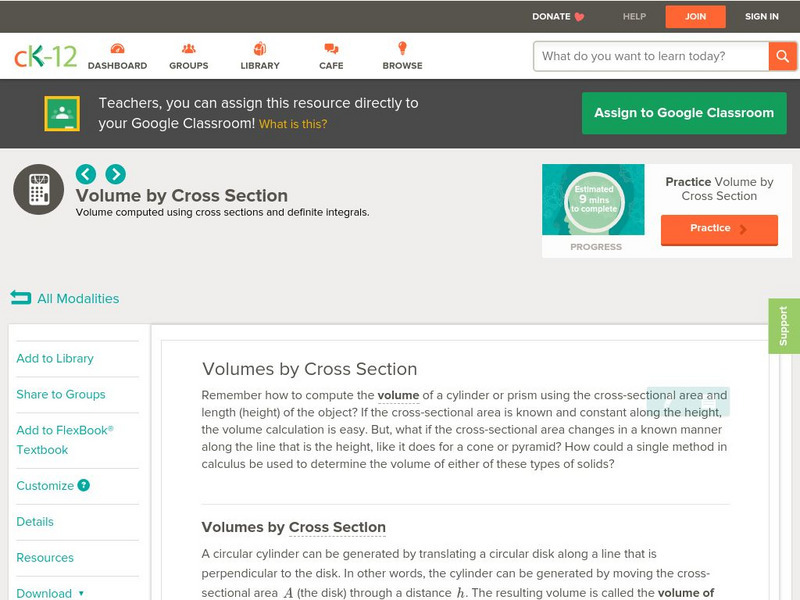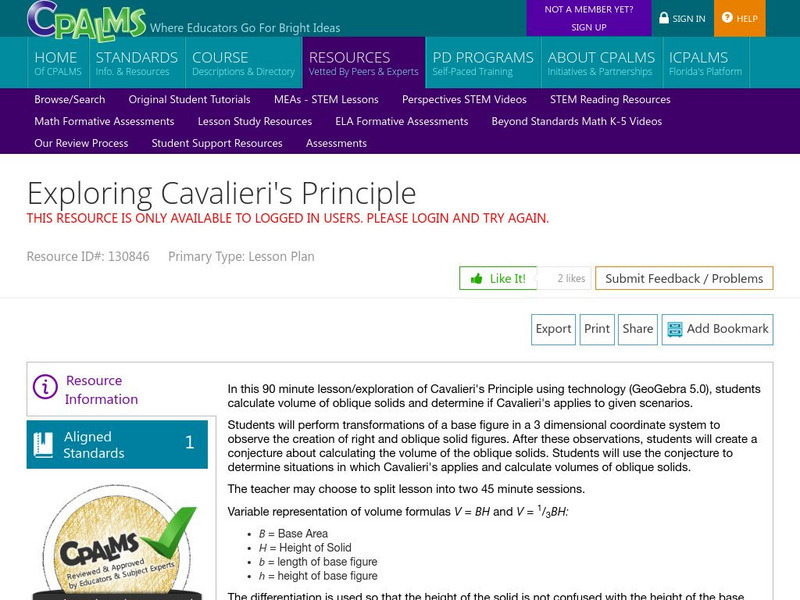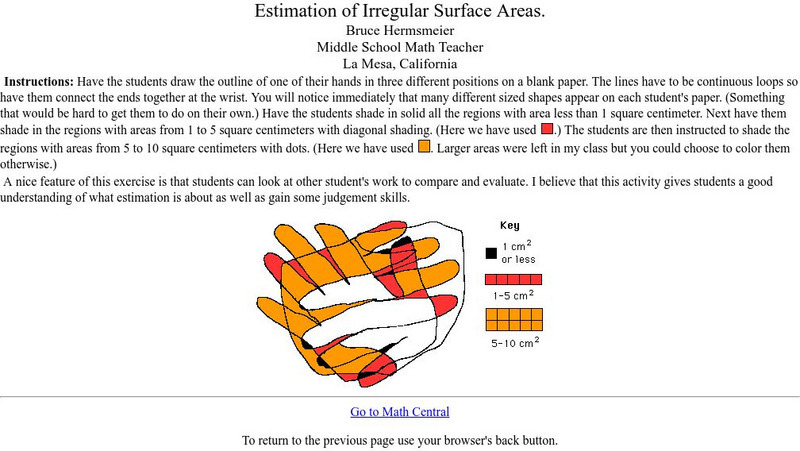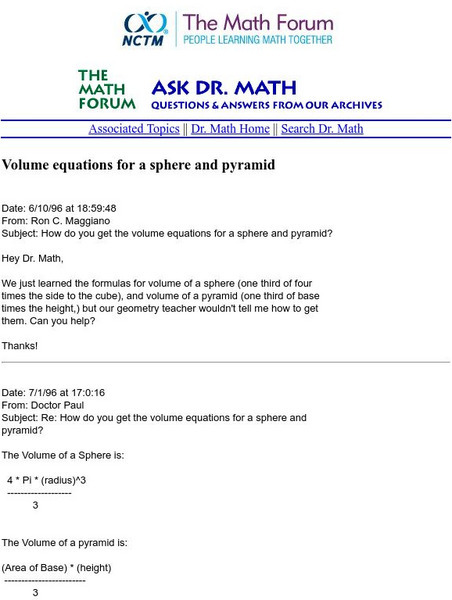Mathematics Assessment Project
Sorting Equations of Circles 2
How much can you tell about a circle from its equation? This detailed lesson plan focuses on connecting equations and graphs of circles. Learners use equations to identify x- and y-intercepts, centers, and radii of circles. They also...
EngageNY
Volume and Cavalieri’s Principle
Take a slice out of life. The ninth section in a series of 23 introduces classmates to Cavalieri's principle using cross sections of a cone and stacks of coins. Class members participate in a discussion using pyramids and how Cavalieri's...
EngageNY
Mid-Module 3 Assessment Task
Time to take a pulse check. The mid-module assessment allows pupils to check where their knowledge falls for the first portion of the module. The 10th resource in a series of 23 covers content from the binomial theorem to hyperbolas....
Radford University
Fun with Solids
Geometry is all around us—if we're only willing to look. The final three activities of the Fun with Solids unit continue work on surface area and volume. For lesson three, scholars investigate the formulas for spheres and solve a problem...
Radford University
2 and 3 Dimensional Shapes
Take a similar approach to three dimensions. Pupils develop the relationship between areas of similar objects and see how they relate to the ratio of the sides. Building upon area formulas, small groups put together volume formulas for...
Mathematics Vision Project
Module 5: Circles A Geometric Perspective
Circles, circles, everywhere! Pupils learn all about circles, central angles, inscribed angles, circle theorems, arc length, area of sectors, and radian measure using a set of 12 lessons. They then discover volume formulas through...
101 Questions
Trashketball
Take a shot using a lesson on volume! Young learners watch a video showing a trashcan filling with paper balls. The task is to calculate the number of paper balls that will fit in the can. Pupils use volume calculations to make a...
Mathematics Assessment Project
Modeling Motion: Rolling Cups
Connect the size of a rolling cup to the size of circle it makes. Pupils view videos of cups of different sizes rolling in a circle. Using the videos and additional data, they attempt to determine a relationship between cup...
Del Mar College
Formulas for Elementary and Intermediate Algebra
Give your scholars the support they need to work with formulas. A reference page offers definitions and picture examples of perimeter, area, surface area, volume, the Pythagorean theorem, a variety of shapes, and more.
EngageNY
The Volume Formula of a Sphere
What is the relationship between a hemisphere, a cone, and a cylinder? Using Cavalieri's Principle, the class determines that the sum of the volume of a hemisphere and a cone with the same radius and height equals the volume of a...
EngageNY
How Do 3D Printers Work?
If we stack up all the cross sections of a figure, does it create the figure? Pupils make the connection between the complete set of cross sections and the solid. They then view videos in order to see how 3D printers use Cavalerie's...
Illustrative Mathematics
Use Cavalieri’s Principle to Compare Aquarium Volumes
Learners are designing a stunning new water feature for an aquarium, but they soon discover that more than just a pretty home for their fishy friends is required. From calculating the volume of a composite shape through the...
National Council of Teachers of Mathematics
The Math Forum: Ask Dr. Math: Faq, Geometric Figures
This page brings you to a table of contents of three-dimensional figures. Selecting a figure will bring you to a page defining and illustrating the figure with applicable formulas listed.
National Council of Teachers of Mathematics
The Math Forum: The Cylinder Problem: High School Lesson
Using an engaging approach, this lesson requires students to record the volume of cylinders as a function of the radius. Students will construct and measure the volume of several cylinders and then begin comparing these shapes.
Texas Education Agency
Texas Gateway: Determining the Surface Area and Volume of Composite Figures
Given a problem involving composite figures made from prisms, pyramids, spheres, cones, and/or cylinders, the student will find the surface area and volume of the composite figure.
University of Waterloo (Canada)
University of Waterloo: Cemc: Math Circles: 3 D Geometry Ii [Pdf]
This worksheet provides a variety of 3D geometry questions requiring higher order thinking skills. Questions include; finding the surface area of a prism, surface area of pyramid, surface area of a sphere, and platonic solids.
CK-12 Foundation
Ck 12: Calculus: Volume by Cross Section
[Free Registration/Login may be required to access all resource tools.] This tutorial explains how to calculate the volume of various solids using the 'slicing' method and then deriving a formula for each solid. It goes on to discuss...
Math Open Reference
Math Open Reference: Solid Geometry
A complete reference guide to solid geometry. The mathematics resource provides definitions and interactive activities that enhance further explanation.
CPALMS
Cpalms: Exploring Cavalieri's Principle
[Free Registration/Login Required] In this instructional activity, students use the geometry program GeoGebra to explore Cavalieri's Principle, specifically to investigate whether it applies when calculating the volume of oblique solids....
Cuemath
Cuemath: Sphere
A comprehensive guide for learning all about spheres with definitions, properties, examples, and practice questions.
Cuemath
Cuemath: Tetrahedron
A comprehensive guide for learning all about tetrahedrons with definitions, properties, formulas, examples, and practice questions.
University of Regina (Canada)
University of Regina: Math Central: Irregular Surface Area Exercise
Students will be engaged by this assignment that has them estimating the areas of irregular surfaces. This includes computing the area of rectangles, triangles, and circles.
University of Regina (Canada)
University of Regina: Math Central: Constructing a Polyhedron
Students are given instructions on how to construct a paper, uniform polyhedron in the shape of a star ball. Animation is used to show the steps to make the star ball. There are also additional modules for other shapes and discussion...
National Council of Teachers of Mathematics
The Math Forum: Ask Dr. Math: Volume Equations for a Sphere and Pyramid
This site uses calculus to explain how the formulas for finding the volume of a sphere and a pyramid were derived.








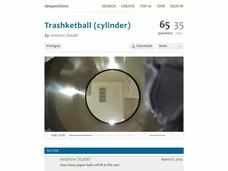


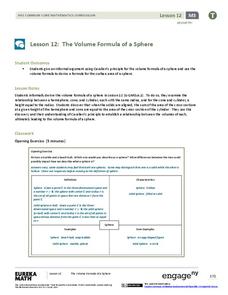

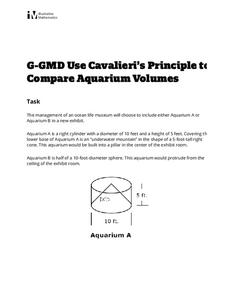
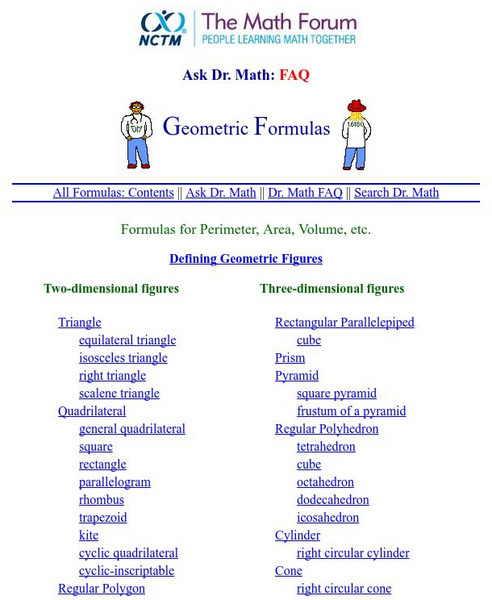


![University of Waterloo: Cemc: Math Circles: 3 D Geometry Ii [Pdf] Unknown Type University of Waterloo: Cemc: Math Circles: 3 D Geometry Ii [Pdf] Unknown Type](https://d15y2dacu3jp90.cloudfront.net/images/attachment_defaults/resource/large/FPO-knovation.png)
